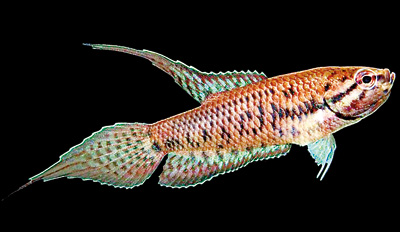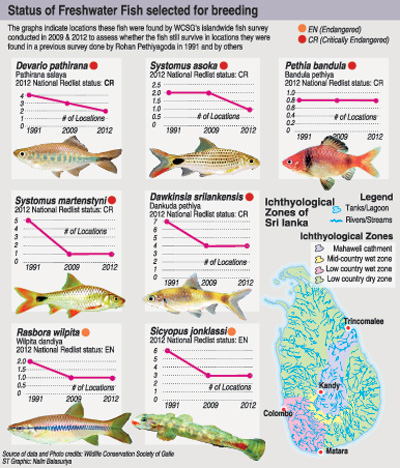News
Environmentalists not in favour of breeding rare fish for export
View(s):By Malaka Rodrigo
Environment watchers are angered by plans to legalise the breeding of rare fish and the cultivation of rare water plants for export. They say the Ministry of Economic Development, the Department of Wildlife Conservation (DWC) and other government agencies are working together to amend the relevant laws.

Malpulutta. Courtesy Galle Wildlife Conservation Society
The export proposal covers eight endemic freshwater fish and 13 endemic water plants. Six of the named fish are “critically endangered” and the other two are “endangered”, according to the 2012 National Red List for Sri Lanka. The Red List is an international classification of the world’s threatened animal and plant species. The water plants include two varieties of “kekatiya” (Aponogeton), seven varieties of “ketala” (Laginandra), and four water plants known as “athi udayan” (Cryptocoryne).
The Wildlife Conservation Society of Galle (WCSG), which has conducted an islandwide survey on freshwater fish, says these fish are too rare to be subjected to a breeding programme. In 2009 and 2012, the society visited areas where, according to previous surveys, the rare fish could be found. A fresh survey noted that most of these rare fish species were not to be found at most of these sites.
Environment lawyer Jagath Gunawardane fears that the export plan could set a risky precedent. Allowing the legal breeding and export of these rare fish could encourage profiteers to hunt for these same fish in the wild.
But the Live Tropical Fish Exporters Association of Sri Lanka says the breeding and export of these rare fish would overall boost lucrative freshwater fish exports from Sri Lanka. At a recent press conference, the association pointed out that Sri Lanka is the loser after restrictions on the breeding of endemic species had led to rare fish being smuggled out of the country and bred elsewhere for profit.
Freshwater fish authority Samantha Gunasekara sees no problem in breeding rare fish, so long as it is done properly and scientifically, and is closely monitored. Mr. Gunasekara, who works for the Customs’ Biodiversity Protection Unit, says that many endemic fish that have completely disappeared from Sri Lanka are being bred in other countries.
The government has appointed a committee to oversee the fish breeding programme. It includes the Department of Wildlife Conservation; the Forest Department; the National Aquatic Research Agency (NARA); the Botanic Gardens Department, and Sri Lanka Customs.Wildlife Conservation Society of Galle president Madura de Silva said fish breeding exercises tended to produce “less colourful” fish than the same species caught in the wild. He feared that exporters would prefer fish caught in the wild.
According to the 2012 National Red List on Conservation Status, one in two species of Sri Lanka’s 91 freshwater fish species risk going extinct in the wild. The most vulnerable freshwater fish are found in streams lying outside the Protected Area Network. These streams are prone to pollution and habitat loss.

Follow @timesonlinelk
comments powered by Disqus















